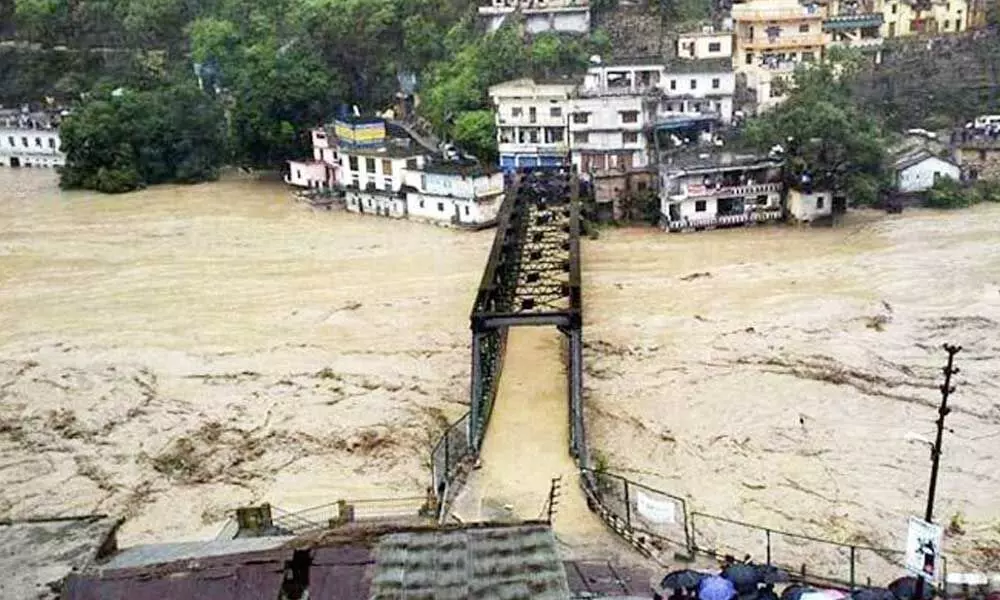Live
- Thanks to Centre, AP on fast-track mode
- First Impressions and Unboxing of the MacBook Pro M4: A Powerhouse for Professionals and Creators
- China Gears Up for Potential Trade War Amid Trump’s Tariff Threats
- Small Farmers Gain Less by Selling to Supermarkets: Study Reveals
- Why Despite the Controversy, America Is Anticipating the Mike Tyson vs. Jake Paul Fight
- Sanju Samson and Tilak Varma Shine: Record-Breaking Feats in 4th T20I Against South Africa
- India Urges $1.3 Trillion Annual Climate Support for Developing Nations
- Bad air: 106 shuttle buses, 60 extra Metro trips planned to make Delhiites give up cars
- WHO reports declining monkeypox cases in Congo
- CM Attends Kotideepotsavam on Kartika Purnima
Just In
'Uttarakhand disaster may be due to water pocket burst'


‘Uttarakhand disaster may be due to water pocket burst’
A massive flood in Uttarakhand's Joshimath area on Sunday is a rare incident of a glacial burst, and may be "a climate change event", say leading climate scientists
A massive flood in Uttarakhand's Joshimath area on Sunday is a rare incident of a glacial burst, and may be "a climate change event", say leading climate scientists.
Satellite and Google Earth images do not show a glacial lake near the region, but there is a possibility that there may be a water pocket, or lake inside the glacier, in the region that may have erupted leading to the disaster, Mohd. Farooq Azam, who is an Assistant Professor at IIT Indore, told IANS.
"We need further analysis, weather reports and data to confirm if this indeed was the case. It's unlikely that this was a cloudburst, since weather reports in Chamoli district show sunny weather till today with no record of precipitation," he said.
"There is no doubt that global warming has resulted in the warming of the region. Climate change driven erratic weather patterns like increased snowfall and rainfall, and warmer winters have led to the melting point of a lot of snow falling. The thermal profile of ice is increasing.... where earlier the temperature of ice ranged from minus six to minus 20 degree Celsius, it is now minus two, making it more susceptible to melting," he said.
Another scientist, Anjal Prakash, who is the Research Director and Adjunct Associate Professor at the Indian School of Business in Hyderabad, said prima facie this looks very much like a climate change event. "The IPCC's Special Report on Oceans and Cryosphere in a Changing Climate reports that climate change has altered the frequency and magnitude of natural hazards. The scientists reported with medium confidence that in some regions, snow avalanches involving wet snow have increased, while the rain on snow floods have also increased at lower elevations in springs," Prakash told IANS.
"We do not have the data now to give you information on what has caused the avalanche in Chamoli district but what we know, prima facie, is that this looks very much like a climate change event as the glaciers are melting due to global warming."
He noted that the impact of global warming on glacial retreat is well documented. "The recent assessment report called the Hindu Kush Himalayan Monitoring and Assessment Programme (HIMAP) report facilitated by ICIMOD has also pointed these out."
The report shows that temperatures are rising in the Hindu-Kush Himalayan (HKH) region and the rise in global temperature will have more impact in the Himalayan region due to elevation-dependent warming. "If the world can keep the temperature rise to below 1.5 degrees Celsius, in the HKH region, it would translate to at least a rise of 1.8 degrees, and in some places, above 2.2 degrees. Himalayan regions are also the least monitored region and this event actually shows how vulnerable we could be. "I would request the government to spend more resources in monitoring the region better so that we have more information about the change process. The result would be that we are more aware and could develop better adaptation practices."
Prakash is an UN's Intergovernmental Panel on Climate Change (IPCC) author who was Coordinating Lead Author of the special report on Oceans and Cryosphere in 2018 and Lead Author of the ongoing Sixth Assessment Report of the IPCC.

© 2024 Hyderabad Media House Limited/The Hans India. All rights reserved. Powered by hocalwire.com






